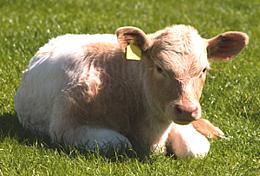
SAFARI
Users
Veal is the meat of a calf, an immature cow, and an inevitable byproduct of the dairy industry. To keep milk cows giving milk they must be made pregnant and produce a calf once a year. Female calves are raised as part of the herd and sent to work in the milk mines when mature. Half the calves are male, which makes them less desirable for milk production.
Dairies have no use for male calves. They used to need one bull to knock up the milk cows once a year, but now they get their bull in a bottle to save the expense and danger of maintaining the ill tempered lout.
You can't have more than one bull even if you wanted to - they'd spend the entire day trying to kill each other. That's natures way, survival of the biggest, meanest and most ill tempered.
You could cut their nuts off and make steers of them, which would greatly improve their temperament, but that still leaves a serious problem. These are dairy cattle, not beef cattle. They won't bulk up fast enough to be economical and the meat won't be properly marbled. You just can't afford to raise them because dog food meat doesn't fetch a sufficient price - and that solution wouldn't satisfy the ethical vegies anyway.
The only thing a dairy farmer can do is sell the male calves off to veal producers where they will be sent to slaughter before puberty brings on the bad disposition. And that is where controversy comes in.
Animal rights advocates, most of whom have never met a live bull and don't know and have little interest in the facts above, claim veal calves are mistreated. They say the calves are kept under inhumane conditions, fed a diet deliberately imbalanced to make them anemic and shot through with dangerous hormones and drugs. The veal industry denies all this and says veal calves are well treated and tested for any medicinal residues.
Who's telling the truth? Probably neither.
Animal rights advocates have a deserved reputation for making false and misleading claims, using photographs of undisclosed date and province, and for shrill emotional appeals short on logic. Industry advocates, with an obvious economic interest, are also noted for exaggeration and misleading statements, though under much stricter scrutiny by government and press. Here are statements from the veal industry (V10) and a representative advocate site (V13).
The "Veal Crates" touted by anti-veal advocates are now illegal in most developed countries - a thing of the past - but are still heavily used by advocates for their propaganda effectiveness. The objective of most of these advocates is not better treatment of veal calves, but to promote veganism - where people use no animal foods or products whatever, and do not inconvenience animals in any way.
In any case, the treatment problem is partially resolved by the current increase in interest by leading chefs in grass fed veal, industry efforts, and state and federal regulations regarding care of veal calves.
I certainly agree that veal calves should be kept under humane conditions for their short lives, but veal production will not stop or decline so long as people buy and consume milk, yogurt, butter, cream and cheese. By the time a calf is born it's already got a lot of money invested in it so it doesn't make sense to just kill all the males right then and there and toss the carcasses into the garbage.
Links
- V10 - Veal Information - Pennsylvania Beef Council
- V13 - Anti-Veal Information - Farm Sanctuary



